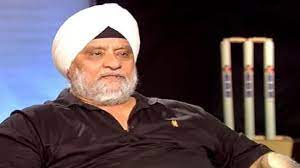Monitoring Desk
NEW DELHI: Indian cricket great Bishan Singh Bedi breathed his last at the age of 77 on Monday.
Bishen Singh Bedi was a left-arm spinner who also captained the Indian team in 22 matches. Bedi was an active cricketer from 1967 to 1979, featuring for India in 67 Tests, taking 266 wickets at an average of 28.71 with 14 five-wicket hauls.
Bedi also played for India in 10 ODIs, bagging a total of seven wickets. Widely considered as one of the finest spinners India have had, Bedi was among the architects of India’s spin bowling revolution.
He, along with Erapalli Prasanna, BS Chandrasekhar, and S. Venkataraghavan, played an important role in India’s first-ever ODI victory. Bedi’s figures of 12-8-6-1 held East Africa to 120 runs in 1975 World Cup.
In domestic cricket, Bedi primarily played for the Delhi team. After retirement, he worked as a coach and mentor for several budding Indian cricketers. Away from the cricketing field, he also worked as a commentator and pundit in the Gentleman’s Game.
Often seen as a critic who refused to mince his words, Bedi was an outspoken character when sharing his views on certain topics in the game.
Bedi had a surgery two weeks ago and was hospitalised in Delhi since then. Bedi is survived by his son and Bollywood actor Angad Bedi, who is married to actress Neha Dhupia.
Bedi was by far India’s most successful left-arm spinner until he was surpassed by Ravindra Jadeja earlier this year during the ICC World Test Championship final against Australia.
India debut
Born on September 25, 1946, in Amritsar, India, Bedi was a left-arm orthodox spinner known for his exceptional skills and elegant bowling action. He made his debut for the Indian national cricket team in 1966 and went on to represent his country until 1979.
The legend of Bishan Bedi
Bedi was a master of flight and spin, renowned for his ability to deceive batsmen with his subtle variations. He played a pivotal role in India’s historic series win against England in 1971, famously captaining the side in the absence of the injured Ajit Wadekar. Under his captaincy, India established its reputation as a competitive cricketing nation.







